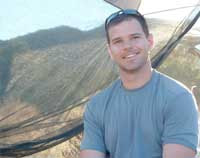 |
| Sam Piha |
Below we offer two videos that capture the importance of taking young people into nature. The first video focuses on older youth who are learning to rock climb. The second video focuses on Oakland children who are visiting nearby Muir Woods. For many, this is the first time that they have been outside of the city.
Youth Development, Entrepreneurship, and Rock Climbing
Nature Now
National parks turn into classrooms to turn a
new generation into nature lovers
You can view an article from the Greater Good Science Center and another article authored by Bob Cabeza.
Below we offer an interview with youth program leaders who can speak directly to the power of outdoor and wilderness experiences for youth, especially inner-city youth.
Q: What are benefits to exposing young people to nature and the wilderness - benefits to individuals, the group, even the adult supervisors?
 |
| Bob Cabeza, Youth Institute |
 |
| Brad Lupien, arc |
Taking kids into nature is a simple and inexpensive way to close an opportunity gap. If we know that learning happens when it is active learning and/or collaborative learning, then outdoor education is a no brainer. Young people must work together to reach a common goal (the top of a mountain, a distant island, or a the other side of a stream) and passive observation as you ascend, paddle, or traverse is simply not an option. At arc, we often find that the adults staff joining the group as “chaperones” become “co-players” without prompt or push. They come as the adult authority and leave as a co-participant. The experience brings out the inner child and melts the traditional student/teacher, learner/presenter relationships. Learning becomes collaborative with the adult vs for the adult.
 |
| Ashanti Branch, Ever Forward Club |
Ashanti Branch, Ever Forward Club: Outdoors are a bonding opportunity for youth. Getting young men out of their regular environment allows for an opening of the mind and a deepening of the heart. Often times within the confines of the concrete jungles with all of the radio waves and search for bars and likes; our young people often miss out on deep conversations and connections that they desperately want and need.
 |
| Dr. Mark Schillinger, DC YMUW |
I have seen how getting young men active and involved in group outdoor activities has helped them develop analytical skills. The demands of being outdoors force them to evaluate situations carefully and to hone their masculine wisdom and logic to make good decisions. Being outside, as it turns out, is not only good for their bodies—it’s also good for cognition. Something magical happens when young men are given the freedom to experience nature. Socially, physically, and mentally, they grow. Nature is the best classroom for them to discover who they really are, practice accepting and dealing with real-world situations, and gain trust in other males and their ability to work together to get things done. They develop confidence in their instincts and overcome their fears of the unknown.
Q: This is important for all children and youth. Why is it especially important for low-income and inner-city youth?
Bob Cabeza, Youth Institute: Well run outdoor education programs in nature teach problem solving, social and emotional learning, build intense positive relationships between peers and adults. It also tests ones confidence and develops critical, analytical, abstract and sequential thinking skills. These experiences can be tailored to teach communication skills, diversity and decision-making, and intense long term team building. – Bob Cabeza
Brad Lupien and Staff from arc: The importance of exposing low-income and inner-city youth to the outdoors cannot be overstated. Many students form our urban centers have no exposure to the state parks, forest areas, public beaches, and lakes right in their backyards. Once they experience nature’s classroom and playground for the first time an awakening can occur within them.
Half of the kayaking trips we take with low-income Los Angeles youth find that the kids have lived in LA their whole life, but have never seen the ocean. Most of the trips we lead with inner-city youth see the most common questions not being about the bugs or the dirt, but “Is this free?” and “Can I take my family?” After playing in the outdoors and feeling that instant connection to nature, it opens up a whole new world that students want to be part of, and they want to take their families with them. It exposes them to healthy lifestyles, environmental awareness, and a love of wildlife that they might not otherwise have access to.
Dr. Mark Schillinger, Young Men's Ultimate Weekend: Getting young children out into nature is important for inner-city youth. Inner-city youth tend to be closed-in by buildings, buses and bulldozers. Nature is the perfect playground for them to more fully challenge their brains in a healthy way to develop their learning skills. Because movement and learning go hand-in-hand, nature affords young people the ability to move more freely, without worry of getting hurt or hurting others. Additionally, inner-city youth are under a great deal of stress. Nature is the perfect playground to release their pent-up energy safely and freely. Additionally, by being out in nature – especially at night – children learn to develop the virtue of, "awe". It's important for inner-city youth to begin to contemplate that nature does not only include the earth, but also includes a vast and mysterious universe that needs to be explored.
------------
Bob Cabeza is Vice President of Community Development at the YMCA of Greater Long Beach and Founder of the Youth Institute. The Youth Institute is a year-round program that uses technology as an integral mechanism for promoting positive youth development and developing pathways to post secondary education and career readiness of low-income, culturally diverse urban high school youth. They built their program culture by exposing their youth to wilderness experiences.
Brad Lupien is President and CEO at arc. arc is an after school and experiential education provider. They bridge the opportunity gap by creating transformational learning opportunities that empower youth to realize their full potential. They rely heavily on engaging youth in outdoor sports and wilderness activities.
Ashanti Branch is Founder and Executive Director at Ever Forward Club. Founded in 2004, the Ever Forward Club mentors young men of color in middle and high school by providing them with safe, brave communities that build character and transform lives.
Dr. Mark Schillinger, DC, is Co-Founder of Young Men's Ultimate Weekend (YMUW). The purpose of YMUW is to provide young men with a weekend filled with incredible fun and challenges, while building a foundation for a confident and successful adulthood, through learning the importance of teamwork, developing a sense of accomplishment and acquiring leadership skills.




No comments:
Post a Comment